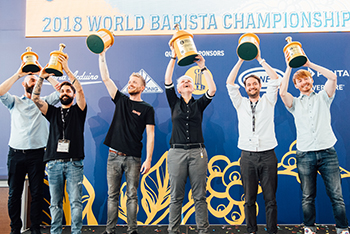
Agnieszka Rojewska of Poland has won the 2018 World Barista Championship (WBC). Agnieszka, a veteran of multiple coffee competitions across the globe, triumphed over 55 other baristas to become the first woman ever to win the title.
Lex Wenneker of The Netherlands was runner up, Mathieu Theis of Switzerland was third place, Michalis Katsiavos of Greece was fourth, Cole Torode of Canada was fifth place, John Gordon of New Zealand was sixth place, and Craig Simon of Australia finished in seventh place.
“I never thought I’d be in the final so the fact I [was] is the best experience,” Rojewska said post-performance. “This is like the craziest day of my life.”
Rojewska of Full Pro Coffee has been making coffee for more than 10 years. She started working in a coffee chain before starting her own cafe. Agnieszka now works mostly as a coffee trainer, but has spent the past four years competing in various coffee competitions, tackling almost every category of competition there is to win.
Rojewska is a three-time Polish Barista Champion and four-time Polish Latte Art Champion with a career high ranking of third in the world in 2017. Rojewska will compete in Poland’s Brewers Cup Championship on Sunday 1 July, and will attempt another world title when she competes in the World Latte Art Championship in Brazil from 7 to 9 November.
Last year, Rojewska placed Runner-Up in the Polish Brewers Cup competition and New York Coffee Masters, but this year has been one of first places, winning the London Coffee Masters competition in April, and now the WBC in Amsterdam.
For her 15-minute routine, Rojewska used a coffee sourced from Project Origin Coffee’s CM Selections lot in Mesina, Ethiopia, a new coffee growing area. Because of the fresh soil and young 10-year-old trees planted at 2300 metres above sea level, Agnieszka said the result in the cup would have “more intense yellow fruit characteristics” and “extraordinary sweetness”.
The Heirloom cultivar underwent washed carbonic masceration processing, a concept Ona Coffee Founder Sasa Sestic first presented to the WBC in 2015, the same year he won the event. With this process, the coffee is depulped, put into tanks and pressurised with carbon dioxide to remove all oxygen and encourage lactic bacteria. The coffee was roasted by 2017 Brewers Cup Runner Up Sam Corra of Ona Coffee.
Rojewska says she chose to use Ethiopian coffee because of how expressive it is, with flavours of yellow and red fruit that are easy to recognise. “It was the first coffee I have fallen in love with,” Rojewska told the judges.
To make her milk beverage exude strawberry notes, Rojewska prepared a more intense espresso using 23 grams in the basket and 36 grams out via the Victoria Arduino Black Eagle machine. She added three-and-a-half ounces of milk to help achieve notes of milk chocolate and warm strawberry jam. The full cream milk had a high fat content for a creamy texture and combined with a lower temperature, reminded Rojewska of slow-melted chocolate ice cream.
Despite her accomplished latte art skills, Rojewska poured a simple small heart in the centre of each cup to help stretch the milk, give more aromatics, and more intense strawberry flavours.
For her signature beverage, Rojewska used Ona Coffee’s O.C.D and Stem devices to produce her shots and made a passionfruit infusion. This was made adding 100 grams of passionfruit to 30 grams of coconut sugar, 50 millilitres of water, and cooked for three hours at 60°C for more natural tropical fruit notes. To replicate the same lactic acid bacteria used in washed carbonic masceration, Rojewska used 100 grams of warm milk and seven grams of citric acid in the form of lime juice, which she then let sit and separate for three hours before straining three times. The end result was 20 grams of ‘washed milk’ and a creamy mouthfeel in her signature beverage. She added 4 grams of this liquid to 100 grams of water infused for 20 hours at 120°C, and blended it together with her espresso shots at 20 grams in the basket, 35 grams out.
Lastly, Rojewska prepared her espressos using the same Ethiopian coffee. Despite her coach Sasa Sestic pointing out that she was 20 seconds behind in his Livestream commentary, Rojewska pushed on, using 20 grams in the basket and 45 grams out to achieve medium sweetness, medium bitterness, and flavours of orange, plum, and low intensity of peach. She used visual aids to describe the body and texture of the body and concluded with a simple message.
“It’s my greatest pleasure to bring this world stage coffee to you as my customers, and most importantly, my friends,” Rojewska said with one seconds remaining on the clock.
In the past week, thousands of coffee professionals gathered in Amsterdam for World of Coffee (WOC), one of Europe’s largest coffee trade show, and the host of the 2018 WBC. Just under 11,000 professionals from across Europe and around the globe registered to attend, breaking records for the event.
Next year, WOC heads to the German capital of Berlin from 6 to 8 June, 2019 at the Messe Convention Center.
source: http://www.gcrmag.com / Global Coffee Report / June 25th, 2018

